- Home
- Tim Niederriter
The Bright Image: Clean Book 3
The Bright Image: Clean Book 3 Read online
The Bright Image
Copyright © 2018 Tim Niederriter http://timniederriter.com/
https://dwellerofthedeep.wordpress.com/
All Rights Reserved.
No part of this work may be reproduced, stored in a retrieval system, or transmitted by any means without the written consent of the author. Unauthorized duplication in any media is a violation of international copyright laws and will be prosecuted.
Published by Mental Cellar Publications This is a work of fiction People, places, events, and situations are the product of the author’s imagination. Any similarity to actual people, places, and events is purely coincidental.
Also by Tim Niederriter
Clean Universe
Ludosensitivity (Short Story) The Mangrove Suite (Book 1, Start here!) The Cleanway (Book 2) The Ocean Conspiracy (Later 2018)
Other Stories
Stolen Parts
Rem’s Dream
Invisibles: Dark Work
Tenlyres
Ilsa and Blue
The Gray Lector
The Lyre War
Find all Tim’s books and podcasts at www.mentalcellarpublications.com
This series is for Peggy, my first great fan.
Book three is for every friend who helped me get through writing it, especially Joe and Tom.
This one was a doozy.
Clean Book Three
Tim Niederriter
All winter the fighting to the west of the city grew fiercer. Each month the casualty reports fed to BrightNet, the news network my partner and I had recently brought online. We received initial recognition reporting on the war thanks to my old connections in the Midwest. Whether we were winning or losing, the war felt far away from the city.
Elizabeth and I were not prepared for the refugees. They fled the war, bringing everything they could take with them. They fled by train, in cars, or on foot if they had no other way.
The thing the refugees had in common made me worry. These people had lived in the center for decades after the arrival of the aeons. Something terrifying was happening to push them east as one.
The letter arrived early spring. An old-fashioned postage stamp on the envelope told me right away who sent it. Within the city paper messages still got used for public delivery as well as a few private ones. The green stamp meant the Green Valley out west.
I opened the letter from my parents with trepidation. We wrote to each other every month, but this one came on the heels of one just a week ago. In the first letter, my mother’s writing seemed nervous, worrying about the closeness of the forces to town.
The second letter made things clearer.
Dear Jethro,
Your father and I have left the valley. We are traveling east with a trailer caravan, hoping to find a working train station. The roads are difficult, and there is fighting between us and them. God-willing we hope to reach the city in two weeks. We know your address, of course, but your father thinks we may have difficulty entering the city. The papers said a lot of people are going east. See you soon, son.
Love, Mom.
I set the letter on the bedside table. Part of me hoped Rebecca wouldn’t see it, but I knew if my parents were leaving the Green Valley hers would not stay. Despite Rebecca’s problems with her family, I only hoped they would arrive safe.
Not long after that, I resolved to do everything in my power to help them.
Unregistered Memory, Jeanine Myles, Train Station, Fort Wayne
Jeanine pushed her sister's wheelchair in front her as she walked with her aunt and the rest of the mayor’s staff toward the train. All around them, the platform teemed with people, the last thousand residents of Fort Wayne, boarding trains and heading west as refugees.
Refugees, Jeanine thought, her eyes watching for cracks in the concrete in front of the wheelchair so she could maneuver to avoid them. She remembered as a child, as her aunt Trish, told her of watching the plague spread on the news.
Newly displaced, homeless people had flooded through the city from the west. Back then a lot of people from Fort Wayne had gone east too, especially after Chicago was evacuated.
Thirty years ago, when her mother and Trish were kids, her sister had told her they were lucky to be able to stay. Trish told Jeanine she’d felt the same way until a month ago. In the dead of winter, the barrier the government had set up near Chicago broke open. What that meant in literal terms, Jeanine didn't know, didn't really want to know. What it meant for her and her family? They all became homeless.
A light flier cruised overhead, a set of flickering luminous points in the spring dusk. Trish watched the flier pass. Jeanine stopped the wheelchair for a moment, following her aunt’s gaze.
“Trish," she said. "What's wrong?"
"They're still fighting west of us," said Trish softly. "Stupid."
Jeanine, who at twenty, was just barely over half of Trisha's age, wrinkled her nose.
"What's stupid about fighting to protect the city?"
"It's stupid because they can't win."
Jeanine had never seen the Chicago barrier in person, but pictures in the mayor's office had shown the structure before and after the breach. Where before had stood a matte black set of domes and walls, after looked like broken black egg shells scattered over the surrounding landscape of trees and plains. Whatever forces had broken the barrier would not stop with only a few units of the military from the east deployed against them.
She pushed her mother's wheelchair up the ramp to the train car they would share with the rest of the mayoral staff. The mayor herself was behind them on the platform, determined to be the last citizen to bid the city farewell.
A heavy cracking sound came from the west, on the edge of the old city. Plumes of black smoke rose into the sky. The taller buildings on the city skyline trembled visibly.
Jeanine accelerated, pushing the wheelchair up the ramp onto the train. She set her mother off to one side in the car. Mom hit the brakes on her chair.
"I won't roll away," she said, sounding sad, but that was the most she seemed capable of, as always.
Trish set down her bags, then slumped into a seat beside her sister and Jeanine, arms folded. She stared out the window on the far side of the train, looking north toward the now deserted outskirts of the city. Jeanine couldn’t help but follow that gaze, wondering at all the animals and other creatures and what they would do without people in the city.
Behind them, Fort Wayne, once a city of three hundred thousand, then more recently of forty thousand, was an absolute ghost town.
Sirens wailed. They’re warning the animals and plants to take shelter, Jeanine supposed with bitter irony.
The city shook again. Some huge shape moved through the streets downtown, advancing on city hall. Jeanine turned to the platform, not wanting to see what happened next.
Mayor Angela Watts stood, looking squat with her towering bodyguard and assistant, Kyle Roland like a black tower at her back. Besides the two of them, the platform was empty that far from the train.
Angela raised her hand over the crowd, said one of her Neo Quaker blessings quietly, as if to herself, then lowered her arm and lifted her voice.
"Citizens of Fort Wayne, we may be going east, but I will always feel responsible for each of you. We will remain a community, even if we cannot remain a city."
A thunderous sound echoed from downtown, cutting off anything else Angela might have wanted to add. She glanced at Kyle Roland, then nodded. The powerfully built man started toward the train.
"It is my firmest wish that God be with each and every one of us," said Angela.
She followed Kyle toward the train doors where Jeanine stood watching. Ev
eryone else already loaded when Angela boarded her train, looking as dedicated and sturdy as ever.
It was a damn shame their ichor had run out a week prior to the evacuation because no one would have a clearly recorded memory of what their mayor looked like as she gazed sadly back at the city she had given her life to lead. Doors sealed on every side. The trains pulled away from the platform.
Angela took a seat near Trish.
"Are you alright?" she asked Jeanine’s aunt.
"I'm worried. About all of this, and what it means."
"The city welcomes refugees, Trisha," said Angela.
"I hope you're right, Mayor," she said softly. "For all our sakes."
Three trains under full power raced east as storm clouds gathered. April rain began to fall. Behind them, smoke rose from the city they once called home. Jeanine didn’t look back.
Unregistered Memory, Elizabeth Ashwood, BrightNet
The broadcaster, Cindy Dearborne said, "The refugee crisis worsened today, with news that an estimated one-hundred-thousand people have been displaced by fighting west of the city. These new arrivals join the already overflowing refugee districts in the northwestern parts of the megalopolis. Right now, exact numbers are unknown, but as many as three-hundred-thousand people are thought to have been displaced so far."
Elizabeth watched the BrightNet, her network's morning broadcast from the control room above the news-desk. She drummed her fingers on her sleeves, arms folded.
"You shouldn't look so tense." Sarah Harper leaned toward her from the other side of the desk.
"Well, I am tense," muttered Elizabeth.
"Sure. But if you sweat, so do your people."
Elizabeth nodded. She had not expected this visit from Sarah, and the news combined with the network's largest donor's arrival were enough to make her nervous any day.
Sarah shrugged.
"Run your network your way. I just want it to work."
"I know," said Elizabeth.
She was past surprise when it came to Sarah's incisive perceptions, with or without ichor.
Sarah and Elizabeth watched Cindy wrap up their now-daily update about the refugee crisis. Fact-checks began to roll in over the feedback network still accessed in the back of Elizabeth's mind. Most people said they had gotten the story right, though estimates of the refugee numbers could become as high as four-hundred-thousand.
"Just two months in," she said softly.
"Hmm?" Sarah turned toward her.
"It's only been two months since the first refugees started to arrive. I hope the flow doesn't keep increasing."
"How many people lived out west before this winter?" asked Sarah.
"Not sure. Census data is inconsistent out there."
"Right, so there's no telling if this is the end or just the beginning of them."
Elizabeth inhaled sharply.
"I don't know if the city could handle another million people."
"We'll find a way if we have to," said Sarah. "Could be a good time to start renovating derelict structures."
Elizabeth shook her head, but couldn't help a smile.
"You went looking for that upside."
"It wasn't a stretch," said Sarah, "but I understand why you're worried. It's natural to feel the pressure in this sort of situation."
“What will the city do?”
“Vote,” said Sarah. “For starters, the council needs to decide our policy going forward. Inclusive borders are fine until the services we use to manage them get swamped with arrivals.”
“Four-hundred-thousand possible people certainly makes for swamping numbers,” said Elizabeth.
“Indeed.” Sarah glanced at the analog clock over the door.
Elizabeth had just reset it that morning. She liked simple machines. Machines she could understand. The clock’s second hand kept ticking with quiet regularity.
“What does Jethro think?” asked Sarah.
Elizabeth frowned.
“I wish I knew. He should be in contact soon, and then I’ll find out.”
Sarah nodded.
“I take it you two are mostly similar on this?”
“Not even,” said Elizabeth. “I worry Jeth won’t see things clearly. He came from the west himself.”
“You may have to convince him of the danger,” said Sarah. “After all, the city is tense enough thanks to Sudhatho’s trial, not to mention the debate over possible aeon reproduction.”
“You just did mention it, though.”
“I know.”
Elizabeth bit her lip.
“Sorry. I guess I’m nervous.”
“I don’t blame you.” Sarah took a step toward the door. “Get in touch if you need any help.”
“I will. Thanks.”
“It’s nothing. Good luck.” Sarah waved and walked out.
Elizabeth leaned against the desk in the control room thinking for too long. Jeth definitely had sympathy for the refugees, and she didn’t blame him for that. The better part of her felt the same way, but given the possibility of more rogue stars coming out of the west, there were risks that had to be handled.
“Good luck,” Elizabeth muttered.
She thought of Annie, her sister. The mantra Annie had given her those years ago stuck with Elizabeth.
I’m smart enough. They should be afraid of me.
I watched the coverage of the last group of refugees arriving from Fort Wayne with Rebecca in our mental sanctuary. Ever since we started sharing memories I felt like a teenager again. I made an unusually large teenager starting to go gray, but the comparison held water in other ways.
The first example on my mind was another thing I shared with Rebecca. With her arm around my shoulders, we lay in bed watching BrightNet’s coverage on my day off of serving as an anchor for BrightNet. She breathed softly in my ear, sounding half-asleep.
But in our shared mindscape, behind closed eyes, the scene around the refugee trains unfolded. The engines rumbled down the tracks past the guard posts on the outside of the station. They reached the platform where sensor personnel recorded and broadcast the event to each of the major networks, which now included BrightNet.
Doors opened and people flooded onto the tiled floors and elevated metal catwalks of the station. I watched the people intently, trying to pick out anyone I might recognize. I had been through Fort Wayne years ago on my journey east.
Rebecca glanced at the projected list of statistics and estimations about the building situation in the district, once sparsely populated, that now contained hundreds of thousands of people forced to flee from the central parts of the continent.
“Two-hundred-fifty-thousand are estimated,” Rebecca shared through our linked speech centers.
“Huh, I heard it could be more than that.”
“Soon it might be. Two-hundred-fifty-thousand seems like an awful lot of people to me.”
“It’s significant, especially considering how the sparse the population is west of the city.”
“Well, until you get to the other coast,” said Rebecca.
“Right.” I wondered for a moment if something equally tense and strange was happening where my brother, Luke, lived in the western megalopolis. If things got as bad out there as they were in the east, he’d write me for sure.
Both cities had been conceived as places to keep humanity safe, or so the aeons suggested.
Even after what I’d seen with Yashelia, what I’d been through against Sudhatho, I still believed most aeons wanted to protect us. Otherwise, there might not be hope, given the kind of threats that lurked between settlements in the green center of the continent.
Rebecca shifted, then pressed her forehead against mine.
“Jeth, you’re worried.”
“Of course I’m worried.” I canceled the scene of the refugees disembarking. “All these people are going to need to find a way to survive. A few months later and they’d be safer, but it still gets pretty cold out there, especially at night.”
Rebecca sighed.
“Don’t forget the rain.”
“I never would.” I ran my hand along her neck.
“That’s a terrible pun, you know.”
“You’re the one who mentioned rain.”
She lay down, head on the pillow.
“Isn’t there somewhere you need to go today?”
“I have plenty of time.”
“If you want to be late for meeting a city council member you have time. If you want to look punctual, not exactly.”
It was my turn to sigh.
“Alright.” I climbed out of bed and went to dress.
For once I didn’t just throw on a set of clothes without paying attention. I dressed in the suit I had bought since BrightNet went online, a slimming black one. Rebecca helped me with the tie.
She must have felt even stranger about the crisis than I did, stranger and stronger. I had barely had anything to do with the immigration process while she had been readjusting to a new identity after the recovery of her memories from Yashelia. She had told me of the lock that still kept part of her memory sealed away just weeks ago.
Rebecca Malik went by Rebecca Waters lately, because her previous identity had been erased when she was cleaned by that same Yashelia. Yet, that day, she was a concerned citizen again, and more than my best friend, my love.
She had stayed in my apartment the night before, following dinner with my friend Thomas. Elizabeth had been absent, invited to some high society function by Sarah Harper. If I had been invited I hadn’t heard about it, but it didn’t bother me. Running the network and being with Rebecca took up pretty much all my time these days. Maybe that meant I neglected social climbing.
As far as I was concerned, there wasn’t anywhere higher to go.
Sudhatho’s trial had put BrightNet, on the map but the world moved on. The news these days still referred to the debate going on among the aeons about Sudhatho’s daughter often, but Sudhatho, a master aeon, languished in prison, hopefully forever.

 Fire Mage
Fire Mage Demon Scroll
Demon Scroll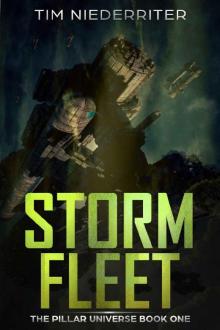 Storm Fleet
Storm Fleet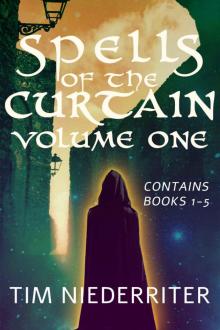 Spells of the Curtain Volume One
Spells of the Curtain Volume One Garden Mage
Garden Mage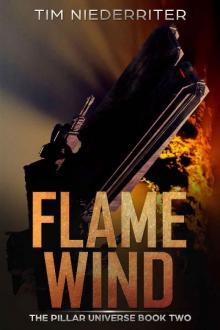 Flame Wind
Flame Wind Traveling Mage
Traveling Mage Winter Mage
Winter Mage Battle Mage
Battle Mage Spells of the Curtain: Court Mage
Spells of the Curtain: Court Mage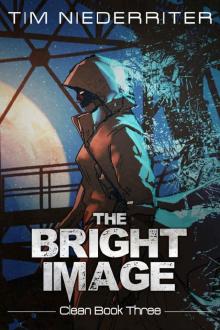 The Bright Image
The Bright Image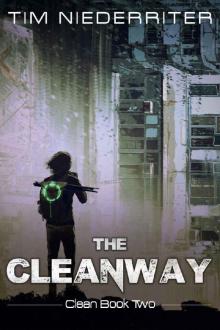 The Cleanway
The Cleanway The Mangrove Suite (Clean Book 1)
The Mangrove Suite (Clean Book 1)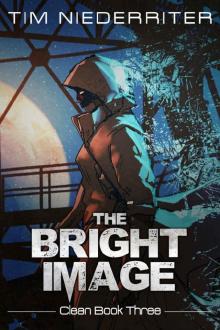 The Bright Image: Clean Book 3
The Bright Image: Clean Book 3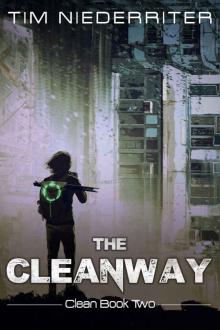 The Cleanway: Clean Book 2
The Cleanway: Clean Book 2 The Mangrove Suite
The Mangrove Suite